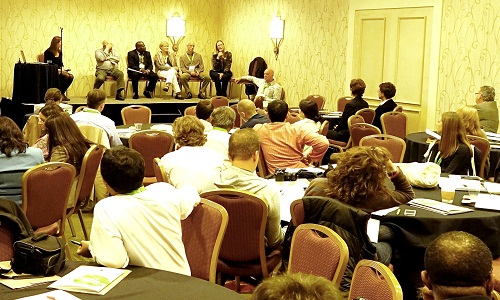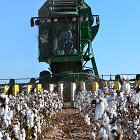"With sustainability taking centerstage, businesses must rethink on their strategy, supply chain, distribution and transparency. These sentiments were echoed during the 5th Annual Organic Cotton Roundtable (OCRT). Close to 230 thought leaders, farmers, textile and fashion industry executives were a part of this conference. Clear initiatives were focussed on seeds and soils, business models, and consumer engagement as material ways to move the organic sector forward."
With sustainability taking centerstage, businesses must rethink on their strategy, supply chain, distribution and transparency. These sentiments were echoed during the 5th Annual Organic Cotton Roundtable (OCRT). Close to 230 thought leaders, farmers, textile and fashion industry executives were a part of this conference. Clear initiatives were focussed on seeds and soils, business models, and consumer engagement as material ways to move the organic sector forward.
“Organic agriculture with its principles of health, ecology, fairness and care not only reminds us of what really matters but also shines a light on how to get there,” said Liesl Truscott, Director of Fiber & Materials Strategy at Textile Exchange, organisers of the OCRT.

Leo Johnson, Partner in PwC’s Sustainability & Climate Change team, introduced the concept of ‘massive small’, mobilising people’s latent creativity, harnessing the collective power of many small ideas and actions. In his keynote, Johnson talked about progressive economics in an age of climate change and the links between progressive economics and the principles underpinning organic agriculture. He asked, “Can organic cotton change the course of business?”
Bob Bejan, GM-Global Communications Strategy, Microsoft, highlighted, “Through the sharing of stories, we can be inspired and more deeply motivated to solve the big ‘wicked’ questions of our time.” US company, Patagonia, regarded as one of the best adventure tales of our time, is always ready to push the boundaries of storytelling. Rachel Cantu, VP Global Supply Chain, spoke of organic regenerative agriculture – which for a clothing brand is very cool. "Conventional agriculture deprives soil of nutrients, requires more water and generates a quarter of greenhouse gas emissions globally. Organic regenerative farming makes for healthy soil, a healthy planet and healthy people,” says Cantu.
The OCRT is shifting the conversation from ‘commodity’ to ‘community’ and the interactive sessions during the day were power-packed. “Conversations begin during the day and continue over dinner. Relationships, and a sense of community, are central to the success of the OCRT. Each year just gets better and better,” says Liesl.
Back home, the OCRT community will work within Task Forces to take the early plans hatched on the day for regional sourcing hubs, a global consumer strategy, and a tool for incentivising best practice and data collection, from concept to reality. Both the Organic Cotton Accelerator (OCA) and the Chetna Coalition are earlier success stories for the OCRT. The OCRT is fulfilling its promise as a platform for all and an incubator for great ideas. In Hamburg, the OCRT took another step toward creating a movement. A movement of the Massive Small!













